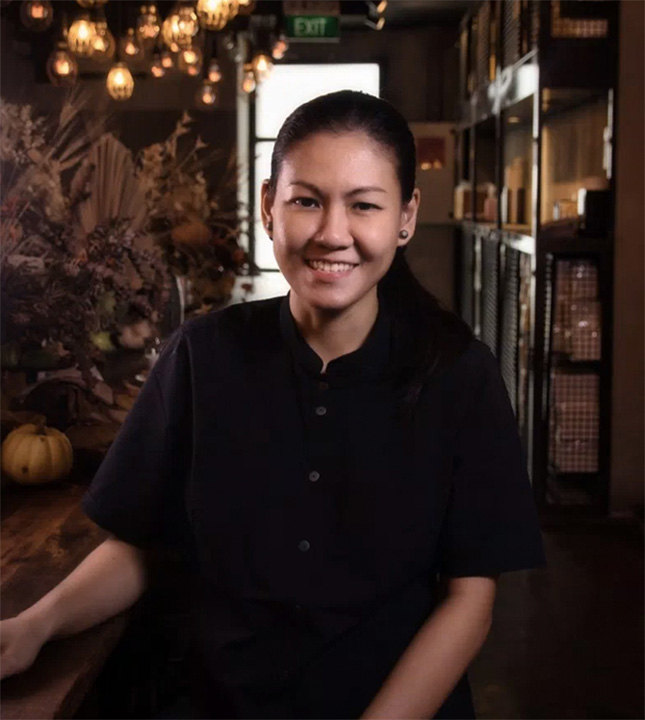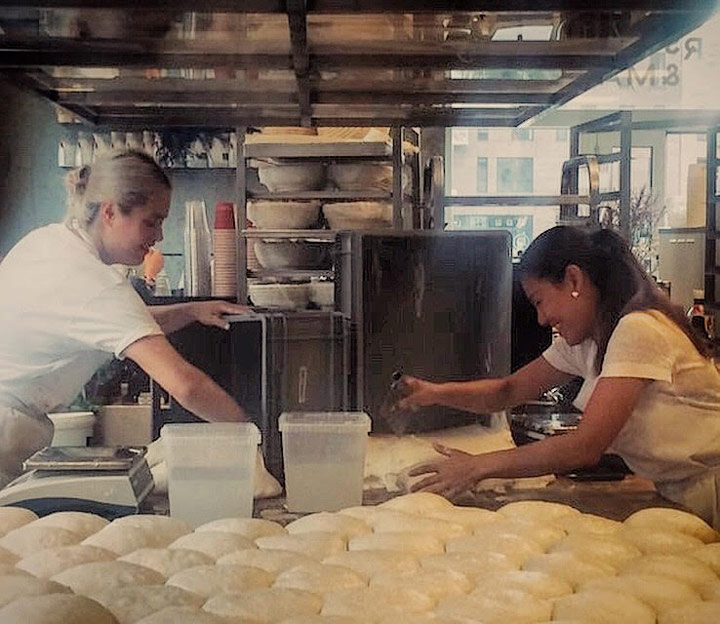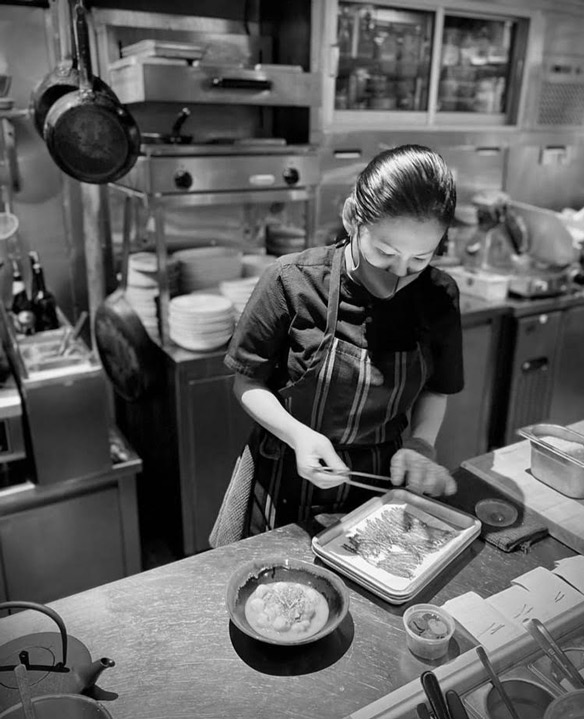The Filipina had to go through many challenges to be where she is now, including a late start, food allergies, and New York train commutes. “I may look like a tiny Asian lady, but in my bag was an arsenal of sharp kitchen knives,” she jokes.
READ ALSO: Just In: Obscura’s DeAille Tam Is Awarded As Asia’s Best Female Chef 2021
Singapore-based World Gourmet Awards recently named Johanne Siy as its Chef of the Year. The Filipina, who is the head chef of Lolla in Ann Siang Hill, says she is deeply honored by the accolade from 20-year-old institution.
“This recognition is an incredible morale-booster and a source of validation for all the hard work that has gone into crafting a menu and experience for our guests,” she says. “I am also incredibly grateful—to my team who empowers me every day; family, friends and the public for their unwavering support.”

Siy started out as a brand builder, but decided to leave the corporate world to pursue her passion in cooking. She studied at the Culinary Institute of America, and trained with the likes of Eric Ripert and Daniel Boulund of Le Bernardin. The Filipina also worked with Andre Chiang of Restaurant Andre for four years.
Lifestyle Asia snuck in a few questions with the chef, and asked her about her beginnings as well as what she thinks the way forward is for the dining industry.
LA: You grew up in Dagupan. How did you develop that passion for food when you were younger?
JS: As a child, I’ve always loved eating. The most vivid memories from my childhood involve food, whether trying something for the first time or hanging around the kitchen bugging the grown-ups to let me help out. Summer school break, was my favorite time because it meant spending our afternoons in the kitchen making kakanin then eating them.
I had an insatiable curiosity about food. I remember that by the time I was six, I had established a line of credit with all the food vendors around my school. I never had money on me because my mom always packed food for us.
But the bounty of snacks that those vendors had on display was too difficult to resist. So, I somehow managed to convince them to let me eat whatever I wanted by telling them my mom would settle it when she arrived. Imagine my poor mother’s surprise when she caught on to what was happening.
You began in corporate brand building, what made you shift to food?
While I’ve always loved food and the act of nurturing others with food. I never considered it as a career. In the past, no one ever encouraged their children to become chefs; that’s a fairly new phenomenon with the advent of celebrity chefs and food TV.
But when I started traveling extensively for work, especially to western countries that were ahead of the curve, I realized how it can be a viable and rewarding career.
In terms of your craft and profession, who do you consider as mentors?
Chef Andre Chiang, Chef Eric Ripert and my mom are probably the three people who have had the most influence on my cooking.
Chef Andre’s food is very personal and that’s part of what makes his cuisine so compelling. Amidst all the trappings of a fine-dining experience, at the core of it, his food is sincere and draws deeply from the heart—and that to me is extremely important.
Chef Eric Ripert’s food is timeless. From the time I worked at Le Bernardin almost a decade ago to the present day, it hasn’t lost its standing as the best restaurant in New York. That has a lot to do with focus, knowing what you are about and making sure you stay true to that. At Le Bernardin, fish is always the star of the plate and that will never change. It’s amazing to see that brought to life every day in a fine-dining restaurant that does about 300 covers a day.

Finally, my mother. I didn’t grow up in an affluent family, but our guests—no matter their background—were always treated like royalty. My mother always extended a level of hospitality that remains unmatched in its sincerity and generosity.
If we only had one piece of fish, you can very well be certain that it would be served to the guest, while everyone else would eat the vegetables or broth. My mom of course would always assure the guest that we had all eaten our share so they wouldn’t feel embarrassed. That had a profound influence on me in terms of how I approach hospitality.
It’s no secret that culinary training is challenging. What were some of your most vivid memories in the course of learning your craft?
I started out on this path later than most because of the career shift, so I had a lot of catching up to do. To maximize my time when I was in New York, I worked and helped out at multiple places. I also volunteered for a lot of events just for the chance to work with some of the chefs I admired the most.
As a result, I was always so exhausted and ended up sleeping on the trains on my way to and from work. My family was so worried when they learned about this, being in New York and all. I told them not to worry, of course. I may look like a tiny Asian lady, but in my bag was an arsenal of sharp kitchen knives.
I also developed a life-threatening allergy to lobsters and langoustine while I was working at Le Bernardin. As a young line-cook, it was my job at one point to break-down crates after crates of these. Time always goes by so quickly in the kitchen, so when you’re prepping and rushing to get ready for service, you don’t really notice all the times you get pricked and cut by the shells.
I suppose the toxins built up in my system. There were times I had to be rushed to the hospital just because I inhaled fumes from lobster shells being made into stock. Even now I’m allergic.
You seem to place an emphasis on produce. Why do you gravitate toward it?
When you are younger, you have an inflated sense of self and think you are this hot shot cook/chef. You’re all about demonstrating that you have mastered this technique versus that. You do things because it’s cool.
But as you mature, your perspective changes. You realize you are only as good as the quality of the ingredients you are working with. You are merely an instrument; using what you know to coax out the flavours and wonders that mother nature has already instilled into these ingredients, so they can be enjoyed at their maximum potential.
My culinary philosophy is simple, produce-driven and very mindful of the provenance of ingredients.
The dining industry was hit hard by the COVID pandemic. How did you and your team adjust?
To say that COVID has been devastating to the industry is an understatement. The new rules of engagement necessitated by this new reality strike at the very cornerstones of hospitality: conviviality; warm, unexpected and spontaneous interactions and genuine connections.
Suddenly, everyone erected a wall around them for survival. Isolation is the new norm. It is a completely new playing field.
It was especially hard for us because we work in an open kitchen. We had to be especially careful with how we handle food, because everyone suddenly became the health police.
Cooking became more challenging because you can’t smell the aroma because of the mask. Tasting the food became a multi-step exercise of pulling down your mask, tasting, pulling it back up, and then washing your hands, something that becomes very challenging on a busy night when every movement matters.
But we found ways to adapt. I have never met people as resilient and determined as those who work in this industry. Everyone rallied together and formed communities to promote and support each other. I believe this is the way forward. The challenge is bigger than any of us individually, so we have to tackle it collaboratively.
What’s next for you?
Apart from industries that deal directly with life and death, the hospitality industry is unapparelled in terms of its direct impact on people’s lives.
At some point, down the line, I’d like to be in a position where I can help elevate the industry in my own little way, whether it’s passing on the knowledge I have gained; helping forge connections and collaboration within our food system; or starting my own project that not only fills an unmet need in the market, but also nourishes people in a more holistic way.

After all these years, I’m still that little girl sitting at my parent’s dinner table, offering the only piece of meat to a house guest and trying to make them feel more at home.





